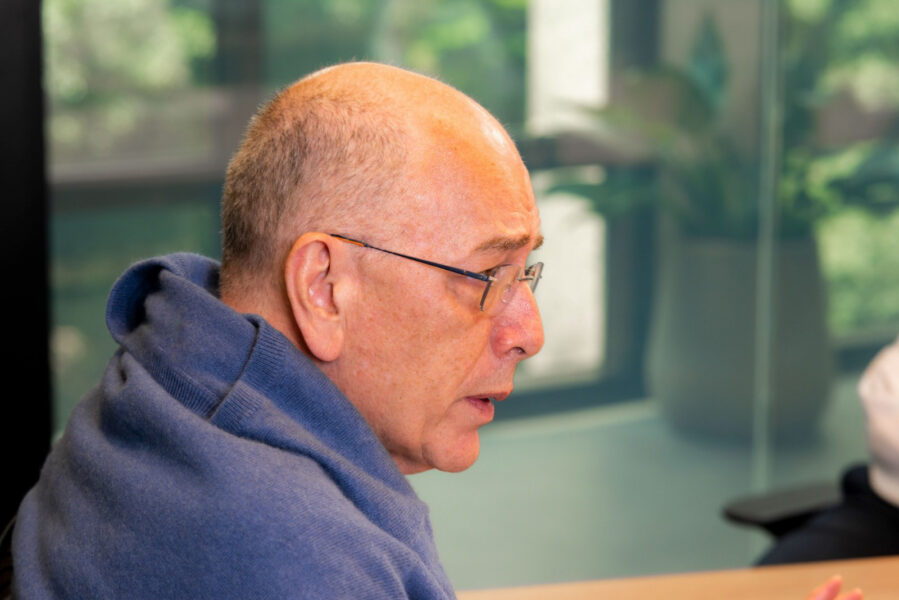
Reputation management has repercussions not only on the financial results of companies, but on the results of actions taken by society, says Pedro – Photos: Gladstone Campos / Especial RF
One of the most versatile managers in the country, Pedro Parente handles highly complex situations like few others. Whether in the public sector or in the private sector, he is recognized for successfully conducting processes to confront crises and restore fragmented organizational cultures. He commanded the committee responsible for managing the energy crisis in 2001, was on the front line of three ministries in the Fernando Henrique Cardoso government (1995-2003), led companies such as Bunge Brasil, Petrobras, Grupo RBS and BRF, is a founding partner of eB Capital, private equity manager.
Talking to him is a lesson in scenery. It's also an in-depth, practical look at high-impact business and the role of reputation in the journey to achieving extraordinary results.
In this interview, held at the headquarters of eB Capital, an elegant, bright and welcoming office on Avenida Brigadeiro Faria Lima, in São Paulo, Pedro spoke about the challenges facing Brazil, the climate of uncertainty and the urgent need for investments to make the country grow back. He commented on the Americanas case, which was experiencing a crisis ignited by the disclosure of accounting inconsistencies in its balance sheet, postulated the relevance of risk management and the preparation of contingency plans in organizations to assess impacts that could affect the survival of the business and further reinforced , that reputation is a matter of responsibility for the board and management of companies.
“Reputation is part of the culture. What is critical is that the initiative not only have the approval of the top leadership of the company, but that it is, in fact, led by the president. Otherwise, no one believes it's for real. If this is not part of the institution's leader's agenda, because it deserves to be, because it has to be because of the relevance it has for the company, it will not work”, he said.
Below are key excerpts from the interview:
In light of the economic and political scenario, what are the challenges for companies in 2023 and how can reputation contribute?
We have a big unknown of a macroeconomic nature and one of a political nature. Lula never committed himself to any direction for his government. We have a fiscal challenge ahead of us, and there are two main ways for you to solve it: one is to carry out fiscal management, either by reducing expenses or increasing revenue, via the tax burden, and the other is through economic growth. For this, the confidence of economic agents is essential. And therefore, the price to pay for a fiscal adjustment will be higher if there is no confidence. And we have the political issue, which faced a very serious situation. We see very contradictory signals about how to proceed. It seems that someone is throwing dirt and another is cleaning up behind it, quickly.
.
From the government itself?
When I say littering, I don't mean unethical things, but polluting the environment a bit. The group behind has been making statements saying 'that's not exactly what the president is talking about'. Obviously, it is a tremendous expenditure of energy and generates or worsens the crisis of confidence. This is a great challenge, the answer to which will only come with a few more weeks of government.
.
How does this cloudiness affect companies' decision-making? How is the market reacting?
The way everyone reacts, no decision is made. You get on with life, spending as little energy as possible, trying to keep your business producing positive results, but without any more ambitious decisions. Today, given the uncertainties, it is very difficult to make bold decisions.
.
Where does reputation come into all this? It is common to hear from C-Levels that reputation is just a consequence, along the lines of 'if I do everything right, I will have a good reputation'.
You have two dimensions of a fact, substance and perception. What prevails is perception. As much as the substance is absolutely correct in the view of these CEOs, if the public perception is different, it does not help. Reputation is the perception of the people around you, the public of interest, about what you do. The relevance is total. There's that phrase, which is a cliché, but true: your examples speak so loudly that I won't listen to what you say.

“Reputation is not a consequence. You have to do reputation management. You have to have contingency plans, like fire insurance. Because if it happens, you need to act immediately.”
Given this scenario, what does a company need to look at if it wants to preserve or take advantage of the opportunities arising from a strong reputation?
Reputation is not a consequence. You have to do reputation management. You have to have contingency plans, like fire insurance. Because if a fire happens, you have to act immediately. And here I want to give the example of Americanas (the company is experiencing a crisis triggered by inconsistencies in its financial statements). First of all, I want to say that I know the three (Carlos Alberto Sicupira, Jorge Paulo Lemann and Marcel Telles, Americanas' main shareholders). I have no doubt of the integrity of the three. The consequence for them and the company would have been different if they had responded immediately. Between the fact and their response, which was very good, unassailable, the reputation of the three shareholders suffered.
“If you have a reputational risk, the impact of which is very large, what is at stake is the company's survival, even if the probability is infinitely low..”
Managing a crisis is time sensitive. Regarding decision-making in a crisis, are there issues that can wait? When should this decision be taken, from the point of view of preserving reputation?
Companies and organizations must have a good risk management system. A matrix maps all risks, even those that have an infinitely small probability of happening. One of the axes of the matrix is probability and the other is the impact it will have, should it happen. You may have circumstances where the risk is very low, but you cannot disregard it if the impact is the company's survival. If you have reputational risk, the impact of which is very large, what is at stake is the company's survival, even if the probability is infinitely low.
So, is reputation management a board topic?
With absolute certainty. I'll tell you a little story that exemplifies well. When I was executive secretary of the Ministry of Finance, negotiating the sale of Banerj with Roberto Setúbal, at the time president of Banco Itaú, he wanted a fund of R$ 3 billion for contingencies. With correction, today the value would be close to R$ 20 billion (sale took place in June 1997). I asked: Roberto, what contingency will this value have? And he: 'there may not be any, I agree that the probability is low, but if there is a contingency with the potential to break my bank, I cannot disregard it'. What mattered to me was this low probability conversation.
What does a good reputation bring in terms of gain, as an asset for the business, worth investing in?
Reputation has an impact on what is one of the most relevant aspects of the company, the bottom line, the end result. We are talking far beyond the financial result, net income, but also the results of the company's action in society, which is increasingly relevant, especially for younger audiences, who will be those who will be more relevant as time goes by.
“Reputation has a very direct connection with credibility. Credibility is not a bottomless bag. If you eventually make a mistake, you can draw on your credibility to mitigate it. But if the mistake is too big or if you keep making new mistakes, that possibility is exhausted.”
.
In this sense, what would you put under this umbrella of reputation? What are the decisive factors for success?
First, understand the process. Because it has to be understood, like the organization's internal culture, not as a consequence, but as a deliberate action by management. Second, you have to map out the risks that could affect your reputation. Reputation has a very direct link with credibility, which is not infinite. If you eventually make a mistake, you can draw on your credibility to mitigate it. But if the mistake is too big or if you keep making new mistakes, that possibility is exhausted.
.
Is there a risk of companies taking a more short-term view that could eventually damage long-term reputations or make a rift in the company's culture?
I have no hesitation in agreeing. Therefore, this initial stage of knowing what reputation is and what impacts it can bring is fundamental. You may be making decisions that will generate a good result in the short term, but you may be drawing on your credibility, which is not a bottomless bag.
.
So, do you have to nurture your reputation in order to build credibility savings to fall back on in times of turmoil?
Integrity is fundamental, which goes far beyond honesty. Integrity is Walk the Talk. Ethics is more than honesty, integrity is more than ethics and honesty. Having integrity towards your audiences helps a lot with reputation and facing downturns, difficult times.

“The correspondence of speech and practice is fundamental and, for reputation, it is indispensable.”
Could you comment on what were the turning points from a reputation point of view in the companiesreasons why You passed? What you said when you got there: this here I have to work on.
At the last market event that I attended for Petrobras, in New York, on May 15, 2018, days before the truck drivers' strike (the stoppage lasted 10 days, blocking highways and compromising the supply of products throughout the country), when I understood that I had to leave, otherwise Petrobras would be hit, an American investor looked at me and said: 'you are the executive who most often does what you say'. Why? Because we made a strategic plan for Petrobras. I said that we would change the price policy, I indicated the areas where we would make investments, I said that I would not change the board without understanding the facts. This was a turning point that we made together with the executive managers. This action with integrity, the ability to listen and change your mind and to combine speech and practice is fundamental and, for reputation, it is indispensable.
.
In your executive trajectory, you positively managed some necessary and highly complex turnarounds. How to promote culture changes in large corporations? Does this have to do with reputation?
Reputation is part of the culture. It is essential that the initiative not only have the approval of the company's top leadership, but that it is actually led by the president. Otherwise, no one believes it's for real. If this is not part of the institution's leader's agenda, because it deserves to be, because it has to be because of its relevance to the company, it won't do any good.
.
From the perspective of the future and ESG issues, as well as the generation that already has these more refined concepts, how should companies talk to these audiences and how should they work on reputation? How to become a company with a reputational license to operate in this new environment?
For us, at eB Capital, it is a very expensive topic. If companies are not in tune with a true belief in these new paradigms, they will not survive. We have been hearing about ESG for several years. At first, everyone knew it was only for the English to see. Later, certain companies began to look closely. And today, precisely because younger people understand the relevance of this, it's a matter of survival. And why it matters: because it is this audience that will lead and shape the world of tomorrow.
Anik Suzuki is CEO of ANK Reputation, Christianne Schmitt is editor of the Reputation Feed and Lucia Ritzel is a consultant mr. and Head of Content at ANK Reputation
christianne.schmitt@ankreputation.com.br
not to lose:
Luiza TrajanO, chairman of the Board of Directors of Magazine Luiza, is the next interviewee in the 2023 Perspectives series.


